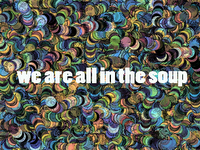Cosmic Soup

"When we were told that by freedom we understood free enterprise, we did very little to dispel this monstrous falsehood. Wealth and economic well-being, we have asserted, are the fruits of freedom, while we should have been the first to know that this kind of "happiness" has been an unmixed blessing only in this country, and it is a minor blessing compared with the truly political freedoms, such as freedom of speech and thought, of assembly and association, even under the best conditions."-Hannah Arendt
Among advocates, there is a tendency to take the notion of "rights" as a given, as if merely invoking or mentioning the word(in the vernacular, "karapatan" would be enough to create a common understanding of the concept.
"Rights" afterall are in a sense a modern day symbol which we closely relate to very basic notions around democracy, freedom and the life of civil society. Often enough, it is at best, hortatory when we "claim" rights or invoke them. On the other hand, the issue of whether or not a person or persons are actually able to exercise rights is always a whole other issue.
For those working to advance women's status,the status of marginalized sexual identities and battling sex and gender discrimination, rights have served a useful political purpose not only for framing interests as legitimate (READ: legally palatable and enforceable claims) but has likewise served as a basis for articulating, and at times, even challenging notions related to identity, community, and freedom.
Critiques about (classical) rights and their built-in limitations within liberal democratic legal systems have shown us how taking "rights" for granted (that is, leaving them unpacked), can often lead to a tendency to ignore the social context of inequalities at the various levels of race, class, sex/gender and ethnicity.
The most well-meaning "human rights" educators have no doubt found themselves grappling with not only the translation of the term rights (locally, karapatan) but likewise with the problem of having a more meaningful discussion of the concept. Bringing rights closer to home, into the practical, and far from just the abstract however often leads to the impractical reduction of "rights" as "legal rights," and "legal remedies."
In my class, a senior law student asked, "why stop at rights ?" Otherwise stated, why continue privileging "rights" above all other concepts, that is even in human rights education?
Moving past the "contest" of rights, what does seem to be an important area for inquiry and discussion are the emerging ethical standards in relation to rights discourse. Indeed, challenging institutional ethical standards (especially sexual morality), seems exactly where current rights discourse is at. No longer limited by a premise of universality (sameness or uniformity), we can confront difference, and engage those arbitrary categories as we bring the discussion closer to home, in the everyday aspect of human relations.





0 Comments:
Post a Comment
<< Home